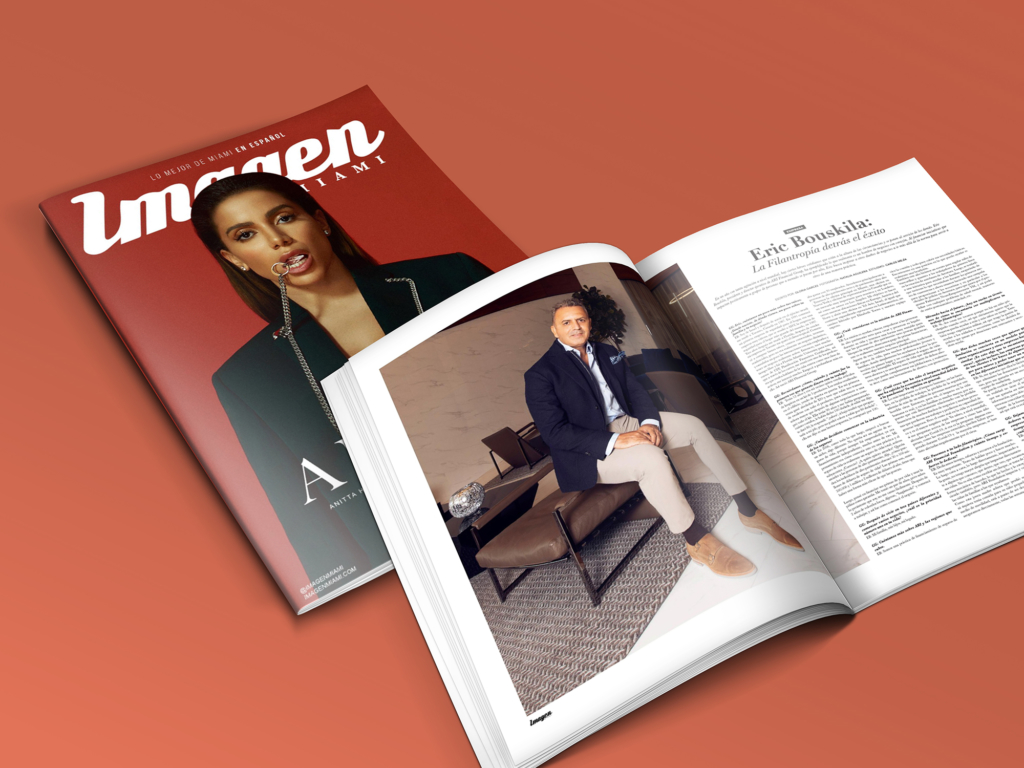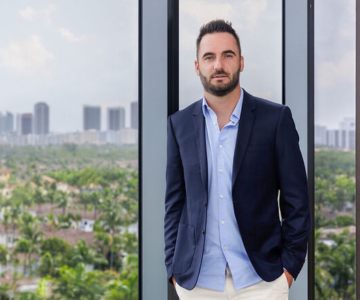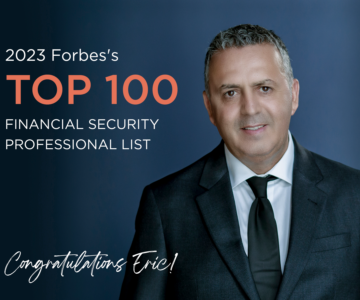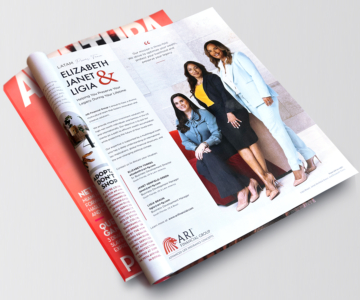In a year with such turmoil globally, there are certain everyday heroes that rise to the occasion and put themselves in the service of others. Eric Bouskila, President and CEO of ARI Financial Group has exemplified what a businessman with a heart truly is. By funding initiatives that positively impact groups of people often overlooked, Eric seeks to inspire other business owners to go beyond the norm to serve others in a practical way.
GG: Eric, tell us a little more about your roots. Where were you born, where do you come from, a little bit about your family and your business.
EB: I’m from Israel and after service in the Israeli army, I moved to Toronto, Canada in 1987. I started my first company in 1991, it was a home security company and it was a very successful company, that was sold to ADT, the largest home security company in the world, in 1997. Three years later I moved to Florida. I started to buy real estate, shopping centers, residential land, but it wasn’t really an active business, and I missed the interactions with my employees and having a real active business. I had a lot of free time and I went to Florida Atlantic University to take courses for CFP, Certified Financial Planning. I took a lot of interest in whole life insurance and started digging deeper into it. That is how ARI Financial came about.
GG: Do you remember, how, when, and how much was the first time that you made money through your job?
EB: Yeah, I was 12 years old, and it was my neighbor who was selling cleaning supplies in a kit of 5 products. I was selling them in the building, going door-to-door. My first sale I made about $20 and had to climb three flights of stairs with all the product, to convince the older lady who after some negotiating bought the entire kit.
GG: That’s awesome!
EB: I even remember who I sold it to!
GG: Oh yeah?! Who did you sell it to?
EB: I sold it to a 90-year-old lady or 85-year-old lady, she made me go up 4 floors, she was on the 4th floor, she asked me “how much is it?” and I said “all five cleaning supplies, 100 shekels.” And she said, “ok, come up boy, come upstairs.” So, I go up 4 floors, remember there’s no elevator and then she goes “I want it for 80.” I said, “you know if I go downstairs, I’m going to have to ask my boss but if I go downstairs, I can’t go back up again for 80 shekels.” And she said, “that’s a good answer, I’ll buy it for 100.”
GG: Yeah, you can’t take no for an answer. Alright, so now, let’s talk about… when did you decide to start in the insurance industry?
EB: In 2006.
GG: Were you already in Miami?
EB: I moved to Miami in 2000. After I sold my company in Toronto, 1997, you know, I liked the tropical weather here and I moved here. As I mentioned, I went to Florida Atlantic University to take courses for CFP, so through the courses, I met with one of the professors who was talking about whole life as an asset class, whole life insurance as an asset class, I took a lot of interest in whole life. I started digging deeper into it. Then, like anything else that I do, I always look for a niche, something different. I didn’t want to be a life insurance agent, per se, to sell life insurance because I was always entrepreneurial, I was financially independent already, long before that. My thinking was how do I really make a practice out of this and the life insurance, in reality whole life insurance, underlying assets. Right? Who do I want to cater to? I wanted to cater to the high net worth individuals, I said how do high net worth individuals secure 50 or 100 million dollars of life insurance? The premiums are, could be 500,000 to 1 million to 2 million dollars a year, there has to be a more effective way for them to own it. Then, I thought about financing their whole life premiums and using the policy as the collateral. It took me a couple of years, but you know how persistent I am, I don’t tire easily. After 2 years of driving them crazy, they said, “let’s do it, and that’s how I started the business.
GG: After living in three different countries and starting several businesses, what is your number one priority in your life?
EB: My family, my kids, my legacy.
GG: Tell us more about ARI Financial and the regions that you cover.
EB: We are a boutique, high-end insurance financing practice with 30 employees. We cater mainly to high net worth and ultra-high net worth individuals. We have the main office in Miami, an office in New York, and representative offices in Panama, which is a very important market for us, and in London; as well as an advisor in L.A. My goal is to grow our physical locations in Europe and to open an office in Tel Aviv, Israel, as well as continue to expand our Latin America business, led by Elizabeth Torres and our experienced team.
GG: And if you would say, what is the mission of ARI Financial, the overarching mission?
EB: The mission is to help, educate, empower high net worth individuals on creating and preserving their legacy during their lifetime and we have a very cost-effective way for high net worth individuals to own large blocks of insurance… paying premium finances; this is really our core business. Aside from that, we also do traditional life insurance planning, for a lot of young professionals and families, where we just help them put protection first and not look at life insurance as intangible. The life insurance we use builds savings and it’s a very important part of their savings, that can supplement their retirements, and it really serves as a saving tool, with protection.
GG: Now let’s talk about… What do you believe has been the negative impact that the economy has suffered globally because of the pandemic?
EB: The biggest thing is the human impact, on people, on families, on losing jobs, losing your security, aside from over a million people dead from this horrible virus. So, to me, the impact on human and real life, and on families, is much greater, of course it’s linked directly to the financial loss of many business owners and many people who lost their jobs and lost their ability to earn an income but the actual cost in life is traumatic and is the biggest negative here. You know, globally, if you’re asking me about businesses and how they’ve been impacted by Covid-19, if that’s the question: some businesses, like essential businesses, may have thrived during Covid-19 and some businesses, and most businesses, have been negatively impacted by the virus.
GG: Let’s move into your philanthropic side. How does ARI Financial Foundation come about and how much time and effort do you put into it?
EB: We put time, effort and resources into the Foundation. It’s very important. I don’t just talk about it, I do it. I do it face-to-face, I do it directly, impacting people, I don’t have a greater joy than impacting someone directly that I know, that I feel, that I see, that we touch their lives. It’s not just like writing a check, which I’ve done, and I’m doing it as well, but ARI Foundation is face-to-face, directly dealing, impacting, and changing the lives of families that we help. Like this young single mom that lost her job, didn’t even have food for her toddler, didn’t have a car, was about to be evicted, and we directly made sure, every week, that she’s getting her food sent and all her basic needs being delivered on a weekly basis. So doing it that way is more meaningful for me, being in a position where I can help is truly a blessing.
This year alone we did an event to give away thousands of masks and gloves to frontline workers at the bus station in Aventura. Then, we moved into an initiative to help families, making sure they had what they needed through the first months of quarantine and then now we are doing a campaign to provide for first responders, and in particular for police officers in Aventura, to go through the Pathwaves program to be able to deal with any mental health issues, PTSD, anxiety, etc. We have been busy at ARI Foundation and we want to do more, much more! We want to have a tangible impact in our communities, we want to support them in any way we can.
GG: Looking towards the future, is there a dream in terms of how you would love to see your philanthropic work multiply?
EB: Yes, two things touched me because I was not a privileged kid when I grew up, so obviously I want to see the company be able to help more and more kids at risk. I also have a military background, so I have the passion to help soldiers or first responders, like police officers, who go through very stressful situations and need help.
GG: You have said many times that you want the foundation to become a model for other organizations and other companies to do something similar, is this something you would love to see for other, maybe even, the companies of some of your clients or the foundations of some of your friends to come together and be able to have a larger impact in the different initiatives that you are leading?
EB: Yes, I would like that. I don’t want to be the one managing other people’s donations or money but, I would like to be a resource for them or my marketing team to say, “here’s 10, 20 kids… here’s 15, 20 families, officers that you can help.” We can help you locate them, and you can have the same impact because my friends in business, they feel the same thing, they write a check and they say, “ok, here I gave 20,000… I have 15,000” but they don’t have that time to stop and think about it. I was in the same situation, I was just like giving money to different organizations, but it doesn’t really have the same impact. So, I think I would like to be more of a platform for resources, for information, to locate the families, and they will create their own foundation and they will do it the way we’re doing it, so this is really my initiative.
GG: For those entrepreneurs that, maybe are just starting their company or they’ve had their company established for a while, but they are also ambitious, they also want to go for it like you, what’s the advice that you can give them?
EB: I can only speak on my business, but I think it applies to every small business: don’t hide behind an email, don’t take no for an answer, and find a way to grind it. In this particular environment, you have to be on the forefront of your business, and you have to be close and in tune to what’s happening in the market because you have competition and a very challenging market that is really depressed at this point. I think being very resilient and, like I said, the door-knocking system. Anybody in a small business, it’s important to be in charge of everything right now, to be on top of every single aspect of your business.



